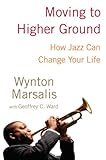I think this book will be of limited interest to most people — but Marsalis has always been a bit of a hero of mine, ever since I started playing trumpet in middle school. I learned to love his playing primarily through his classical music — his Hayden, Hummel & L. Mozart recordings were a revelation to me, and I can still hear them in my head now, 25 years later.
I saw his jazz ensemble play live in Dallas in the early 90s — this tiny little club, and I was at a table about 10 feet away — amazing. And then again at Stanford while I was there (and I talked with him for a bit because he had forgotten his mouthpiece — I offered to run to get mine — was the same 1C that he used — but was too far away to be useful).
Over the past decade or two his focus has been on jazz, of course, and his work at Lincoln Center has been a lot about helping Americans — kids in particular — understand the history and legacy of the music. He obviously cares deeply about both, and thinks there’s much to gain from others understanding it.
Marsalis is not known for being the best performer of jazz ever — some of what he does is not quite as interesting as a lot of performers, today and historically. But I have great respect for the man and his craft and his sense of seriousness (and fun) in teaching others to understand it.
So this was a fun book to read, because it’s a bit of a survey of jazz, filtered through Marsalis’ brain — he knew a ton of the principals, has played with many. Here are a few fun quotes:
“The blues is a vaccine: It’s the controlled dose of something bad that prepares someone to deal with the approaching uncontrollable bad.”
“Jazz teaches empathy — you create and nurture a feeling with other people — and it also teaches you to do your own thing. In our music, there are so many ways for people to find and express their individuality, no single set of rules could possibly apply.”
“In music and in life, serious listening forces you to recognize others. Empathetic listeners almost always have more friends than other people, and their counsel is more highly valued. A patient, understanding listener lives in a larger world than a nonlistening know-it-all (no matter how charismatic). Jazz sharpens your hearing because you are following musicians’ ideas and trying to hear the human depth of their sound.”
“…once the band begins to play, they know that for the next hour and fifteen minutes, everyone — musicians and waitresses, the initiated and the unsuspecting — will be united in the purest possible expression of community, having made the choice to become ‘us’ instead of ‘me’.”
And a funny story:
“I first met Dizzy [Gillespie] when I was about fifteen years old at a club called Rosie’s on Tchoupitoulas Street in New Orleans. My dad said, “This is my son. He plays trumpet.”
Dizzy was standing near the dressing room doorway. He handed me his horn and said, ‘Play me something, man.’ He had a real small mouthpiece. I wasn’t used to playing that — pooooot. He didn’t know what to say with my daddy standing there, so he said, ‘Yeaaaah’ — really drawn out, as if the length of it could help ease the awkwardness of the moment. And then he leaned down close to me and said, ‘Practice, motherfucker.'”
🙂
This was the first e-book on Kindle that I read where I really wanted music attached to the file so that I could listen to the music that he was talking about from Monk or Coltrain or Davis — would really have enriched the experience a lot, and no reason that can’t happen in the future.


slide.013-tm.jpg
Apr 5, 21:31 › bizim mekan: thank you very much admin. Oct 18, 6:51 › duygu sohbet: seviyeli online duygu sohbet odalar? Oct 6, 10:01 › ????????: 1968's "The Secret War of Harry Frigg" stars Paul Jun 13, 23:25 › PeterKed:Home
Jun 26, 21:11 › kev: I am sorry I missed this when it actually occurred Jun 19, 17:00 › Ken: I was doing a search on "shoulder problems" and came